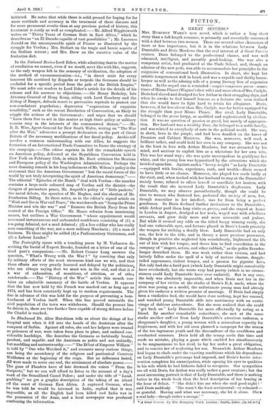FICTION.
A GREAT SUCCESS.*
Man. Humeastir WARD'S new novel, which is rather a long short story than a full-length romance, is primarily and essentially concerned with a duel between two women. There are several other characters of more or less importance, but it is in the relations between Lady Dunstable and Doris Meadows that the real interest of A Great Success centres. Doris belonged to the professional classes, and was well educated, intelligent, and passably good-looking. She was also a competent artist, had graduated at the Slade School, and, though an admirer of the new gods, was able to accommodate her principles to the exigencies of conventional book illustration. In short, she kept her artistic temperament well in hand, and was a capable and thrifty house- keeper as well as the adoring wife of a young literary lion of expensive tastes. In the sequel one is reminded—magniscomponere pares—some- times of Minna Planer (Wagner's first wife) and more often of Mrs. Carlyle. Doris had slaved and drudged for her Arthur in their struggling days, and when he awoke to find himself famous as a lecturer she soon realized that she would have to fight hard to retain his allegiance. Doris, however, if far less clever than Mrs. Carlyle. was far better equipped for the struggle than poor Minna Planer. Her rival, Lady Dunstable, belonged to the genus harpy, as modified and sophisticated by civiliza- tion. It was no question of passion or greed, but merely of appropria- tion. Her husband was a wealthy Peer, she belonged to a noble family, and was related to everybody of note in the political world. She was, in short, born in the purple, and had been dandled on the knees of Premiers and Cabinet Ministers. She was, moreover, well read, a brilliant talker, and could hold her own in any company. She was not in the least in love with Arthur Meadows, but was attracted by his mind, and anxious to exploit him as a whetstone for her own wits. This was her usual way ; she was quite unscrupulous in gratifying her whim, and the young lion was hypnotized by the attentions which she lavished upon him. Against such a "heavy-weight "as Lady Dunstablo —equipped with brains, experience, rank, and wealth—Doris seemed to have little or no chance. Moreover, she played her cards badly at the start, and, when invited with her husband to stay at the Dunstables' stately home, refused to efface herself or conciliate her hostess, with the result that she incurred Lady Dunstable's displeasure. Lady Dunstable, we may observe parenthetically, though she could be nice to women who flattered her, preferred the society of men, but, though masculine in her intellect, was far from being a perfect gentleman. So Doris declined further invitations to the Dunstables, while Arthur paid them long visits en garcon, and she stayed at home in London in August., drudged at her work, waged war with rebellious servants, and grew daily more and more miserable and jealous. But while it seemed any odds on the titled harpy winning easily, she had one vulnerable spot, and fortune placed in Doris's hands precisely the weapon for striking a deadly blow. Lady Dunstable had an only son, the heir to the title, and in theory a most precious possession, though in practice she neglected him scandalously, frightened the life out of him with her tongue, and drove him to find consolation in the company of "singers, actors, and other rubbish," as the polite Branden- burger described them. Ho was weak rather than vicious, and had latterly fallen under the spell of a lady of mature charms, draggle. tailedappearance, violent temper, and a passion for gigantic hats. Not only had she a lurid past (which Lady Dunstable might conceivably have overlooked), but she wrote very bad poetry (which in no circum- stances could Lady Dunstable have ever endured). But in any case, the lady was absolutely impossible, and when Doris met her in the company of her victim at the studio of Doris's R.A. uncle, where the siren was posing as a model, the unfortunate young man had already given his enslaver a written promise of marriage. If Doris had simply been a vindictive fool, she would have done nothing, kept her counsel, and watched young Dunstable slide into matrimony with an exotic virago of dubious antecedents. But she soon realized that she could "get back on" Lady Dunstable far more effectually by acting as a friend. By another remarkable coincidence, she met at the same studio another sufferer from Lady Dunstable's atrocious rudeness, a clergyman's daughter, a young woman with a miraculous capacity for forgiveness, and with her aid soon planned a campaign for the rescue of the too ingenuous youth and the discomfiture of the overblown and overhatted sorceress. Doris held all the trump cards this time and made no mistake, playing a game which enabled her simultaneously to be magnanimous to her rival, to lay her under a great obligation, and to convict her of neglecting her son. Meanwhile Arthur Meadows had begun to chafe under the exacting conditions which his dependence on Lady Dunstable's patronage had imposed, and Doris's heroic inter-
vention completes his emancipation, while opening his eyes to qualities in his wife which he had hitherto failed to recognize. Our sympathies are all with Doris, for Arthur was really rather a poor creature; but the most interesting portrait is that of Lady Dunstable, and there is nothing better in the whole book than the brief description of her bearing in the hour of defeat. " ' She didn't kiss me when she said good-night!' said Doris suddenly. 'She wasn't the least sentimental—or ashamed— or grateful. Having said what was necessary, she let it alone. She's a real lady—though rather a savage.'"
• 4 lineal Success. By airs. liumphry Ward. London : Smith, Elder. [35.0d. net.]


































 Previous page
Previous page